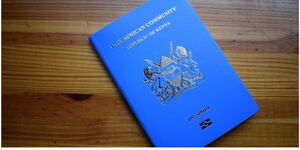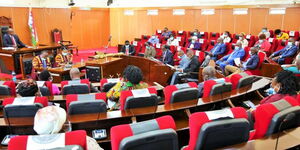Despite austerity measures put in place to curb excess spending and shrink budget deficits, the government is still struggling to seal loopholes which make its efforts retrogressive.
The latest report released by the auditor general, Nancy Gatungu, has revealed that the government is not only losing money to ghost workers but students too as the fight against embezzlement of funds remains a piped dream.
According to the Gatungu, the government lost nearly Ksh1.2 billion through unsupported capital grant financing to private universities in the financial year 2021/2022.
Breakdown of the money: Private universities, whose identities were not released, received Ksh3.3 billion and only accounted for Ksh2.1 billion, raising questions on the balance.
Ksh265 million was disbursed to five universities with the said universities failing to provide acknowledgement letters and receipts to confirm the payments.
Elsewhere, three universities could not account for Ksh15 million which was part of a Ksh198 million disbursement. The three only confirmed receipt of Ksh183 million.
Thirteen universities were found to have hosted 404 ghost students duplicated from thirteen universities. The students were said to have benefited from a Ksh22 million disbursement whose main purpose was undisclosed.
"However, analysis of the supporting schedules revealed that these students had been duplicated in the schedules resulting in an overpayment of Kshs22,591,680," the report stated.
At the same time, Ksh136 million was transferred to 3, 357 students who by the time of the disbursement had already completed school.
"The 3,357 students had graduated by November 2021 and, therefore, management may have disbursed funds for students who had already completed studies and exited the universities," the report disclosed.
About 8,964 students who were not registered at their respective schools and were suspected to have quit or deferred were also awarded a total of Ksh376 million in the period between July 2021 to June 2022.
Finally, 7,828 students who had been enrolled for more than the required duration of four years were also awarded Ksh337 million. Consequently, the AG noted that the state universities incurred an irregularity of Ksh8 million in foreign and domestic work travel.
Most of the public universities were also not up to date with their monthly bank reconciliation statements, which cost the state Ksh187 million as the institutions could not account for the money.
"Bank reconciliation statements for June 2022 reflect payments in the recurrent and development cash books not in the bank statements of Kshs166,163,553 and Kshs84,413,082 respectively whose dates of clearance by the bank was not indicated," stated part of the report.
To mitigate the financial crisis facing tertiary institutions, necessitated by an earlier financing model, the Ministry of Education ended funding for students in private universities in May 2023.
Education CS Ezekiel Machogu announced that the decision was part of reforms outlined to aid universities achieve financial stability.
“Henceforth, no government grant is going to a private university and parents opting to enrol their children in private institutions shall have to bear the cost,” Machogu stated while appearing before the National Assembly Public Investments Committee on Education and Governance (PICEG).












